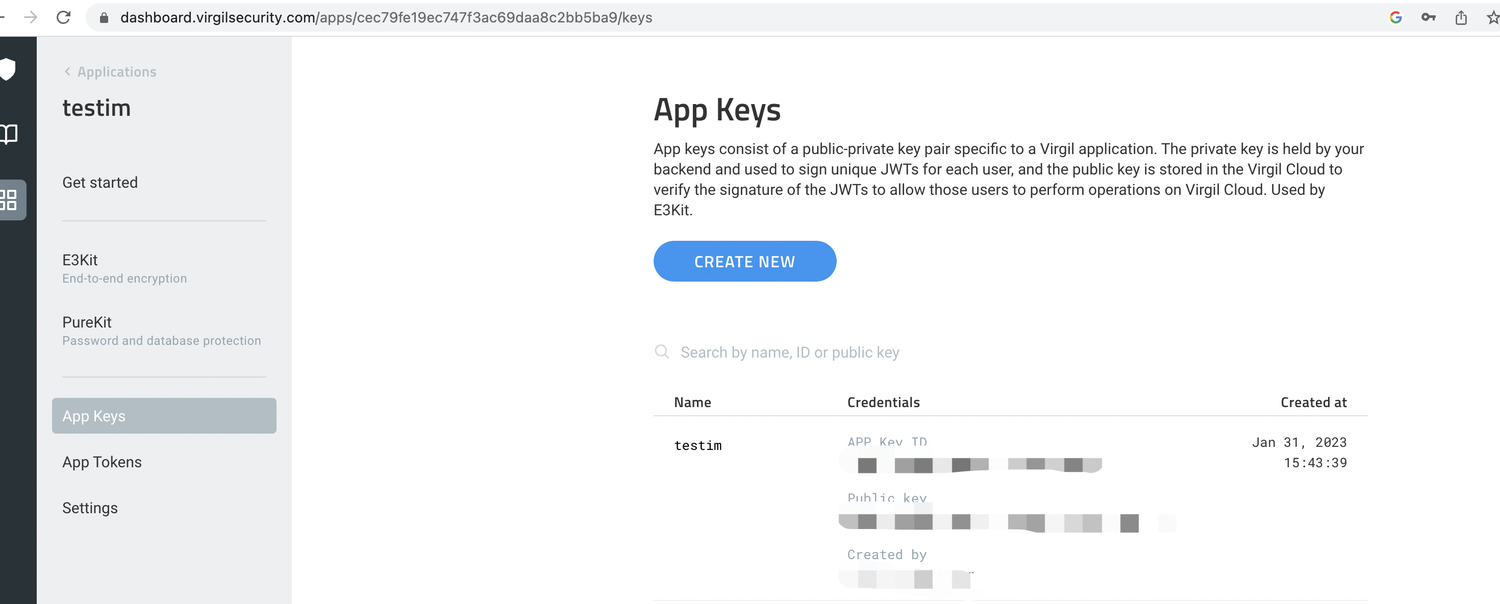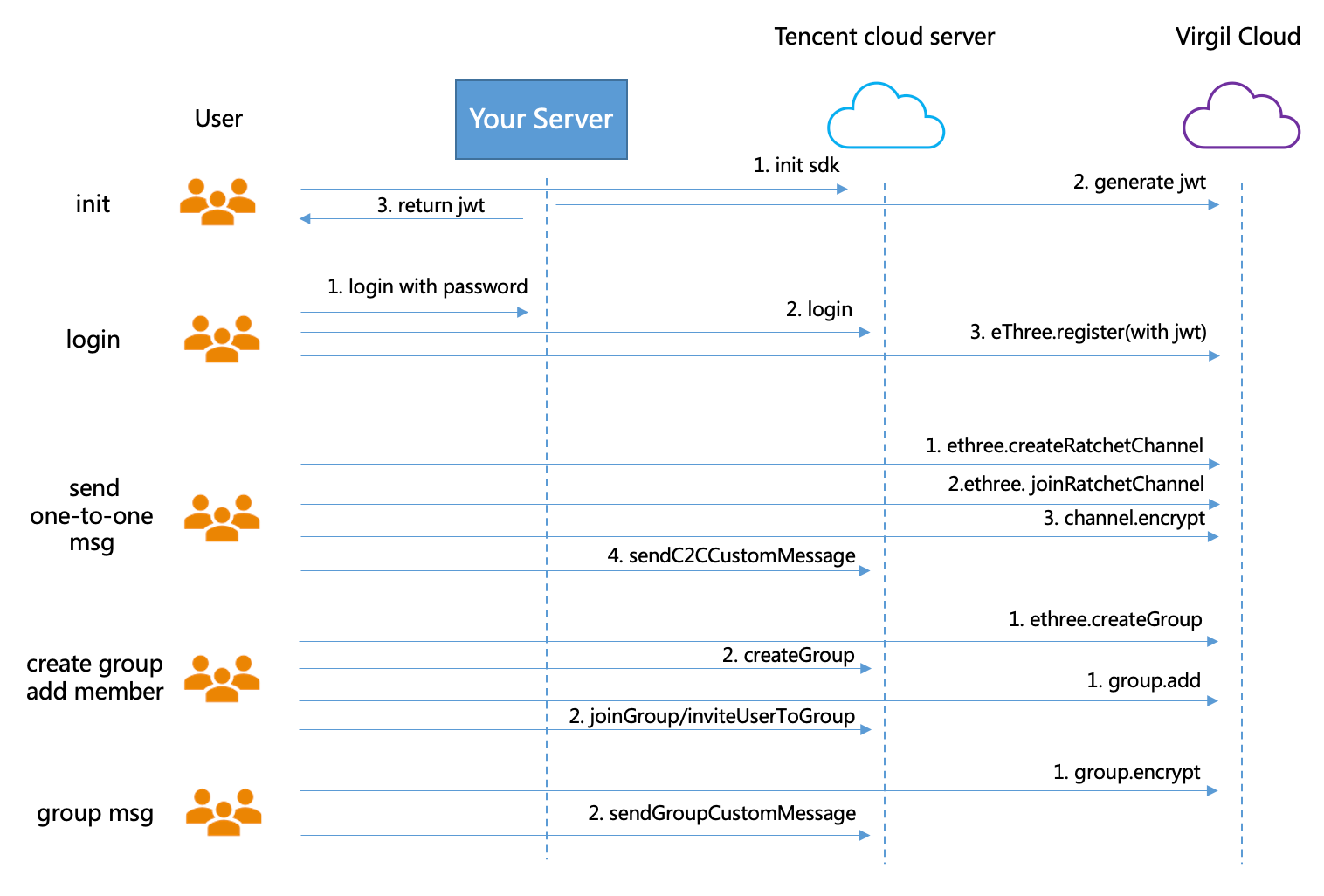End-to-end encrypted chat with Virgil
End-to-end encrypted chat with Virgil
Overview
This solution should be implemented by the customer's application based on the E3Kit of virgin security and Tencent Cloud Chat Sdk. The E3Kit document link: Virtual gild E3Kit|Virtual gild Security
Learn about the GroupEncryption-End-to-End-Encryption-E3Kit|Virtual Security documentation before reading the following solutions, especially the JWT token(JSON Web Token), create channel/create group, encrypt and decrypt messages.
Open application in virgin security console before using. This product is a paid product. See Pricing|Virgin Security for specific pricing.


The diagram below shows the high-level communication flow:

Broad implementation overview(example:Android)
Initialization
1.Tencent Cloud imsdk initialization
// 1. Get the `SDKAppID` from the Chat console.// 2. Initialize the `config` object.V2TIMSDKConfig config = new V2TIMSDKConfig();// 3. Specify the log output level.config.setLogLevel(V2TIMSDKConfig.V2TIM_LOG_INFO);// 4. Add the `V2TIMSDKListener` event listener. `sdkListener` is the implementation class of `V2TIMSDKListener`. If you don't need to listen to IM SDK events, skip this step.V2TIMManager.getInstance().addIMSDKListener(sdkListener);// 5. Initialize the IM SDK. You can call the login API as soon as you call this API.V2TIMManager.getInstance().initSDK(context, sdkAppID, config);
2.E3Kit initialization, passing in the console configuration information, and generating jwt. Corresponding operation document link: GenerateClientTokens-GetStarted-E3Kit | VirgilSecurity
The server generates jwttoken and sends it to the client
// generate jwt// App Key (you got this Key at the Virgil Dashboard)String appKeyBase64 = "MC4CAQAwBQYDK2VwBCIEINlK4BhgsijAbNmUqU6us0ZU9MGi+HxdYCA6TdZeHjR4";byte[] appKeyData = ConvertionUtils.base64ToBytes(appKeyBase64);// Crypto library imports a key pairVirgilCrypto crypto = new VirgilCrypto();VirgilKeyPair keyPair = crypto.importPrivateKey(appKeyData);// Initialize an access token signer that signs users JWTsVirgilAccessTokenSigner accessTokenSigner = new VirgilAccessTokenSigner();// Use your App Credentials you got at the Virgil Dashboard:String appId = "be00e10e4e1f4bf58f9b4dc85d79c77a";String appKeyId = "70b447e321f3a0fd";TimeSpan ttl = TimeSpan.fromTime(1, TimeUnit.HOURS); // 1 hour - JWT's lifetime// Setup a JWT generator with the required parameters:JwtGenerator jwtGenerator =new JwtGenerator(appId, keyPair.getPrivateKey(), appKeyId, ttl, accessTokenSigner);// Generate a JWT for a user// Remember that you must provide each user with a unique JWT.// Each JWT contains unique user's identity (in this case - Alice).// Identity can be any value: name, email, some id etc.String identity = "Alice";Jwt aliceJwt = jwtGenerator.generateToken(identity);// As a result you get user's JWT, it looks like this: "eyJraWQiOiI3MGI0NDdlMzIxZjNhMGZkIiwidHlwIjoiSldUIiwiYWxnIjoiVkVEUzUxMiIsImN0eSI6InZpcmdpbC1qd3Q7dj0xIn0.eyJleHAiOjE1MTg2OTg5MTcsImlzcyI6InZpcmdpbC1iZTAwZTEwZTRlMWY0YmY1OGY5YjRkYzg1ZDc5Yzc3YSIsInN1YiI6ImlkZW50aXR5LUFsaWNlIiwiaWF0IjoxNTE4NjEyNTE3fQ.MFEwDQYJYIZIAWUDBAIDBQAEQP4Yo3yjmt8WWJ5mqs3Yrqc_VzG6nBtrW2KIjP-kxiIJL_7Wv0pqty7PDbDoGhkX8CJa6UOdyn3rBWRvMK7p7Ak".// You can provide users with JWT at registration or authorization steps.// Send a JWT to client-side.String jwtString = aliceJwt.stringRepresentation();
The Android client initializes the E3Kit, tokenCallback is the jwttoken returned by the above server, and User1 is the user ID
// initialization E3Kit// create EThreeParams with mandatory parameters// such as identity, tokenCallback and contextEThreeParams params = new EThreeParams("User1",tokenCallback,context);// initialize E3Kit with the EThreeParamsEThree ethree = new EThree(params);
User Login
1.Call Tencent Cloud Chat Sdk login method for account login
String userID = "your user id";//Generating UserSig | Tencent CloudString userSig = "userSig from your server";V2TIMManager.getInstance().login(userID, userSig, new V2TIMCallback() {@Overridepublic void onSuccess() {Log.i("imsdk", "success");}@Overridepublic void onError(int code, String desc) {// The following error codes indicate an expired `userSig`, and you need to generate a new one for login again.// 1. ERR_USER_SIG_EXPIRED (6206)// 2. ERR_SVR_ACCOUNT_USERSIG_EXPIRED (70001)// Note: Do not call the login API in case of other error codes; otherwise, the IM SDK may enter an infinite loop of login.Log.i("imsdk", "failure, code:" + code + ", desc:" + desc);}});
2.Call the eThree.register method to register the user to virgilsecurity. The corresponding operation document link: UserAuthentication-E3Kit | VirgilSecurity
Note:User of im_ ID and user registered on virtilsecurity_ The id should be consistent
Start a one-to-one chat
1.Call the ethree.createRatchetChannel method in the E3Kit to create a one to one session (User1 and User2), and the corresponding operation document link: https://developer.virgilsecurity.com/docs/e3kit/end-to-end-encryption/double-ratchet/?#create -channel
User1 creates a channel with User2
// create one-to-one channelethree.createRatchetChannel(users.get("User2")).addCallback(new OnResultListener<RatchetChannel>() {@Override public void onSuccess(RatchetChannel ratchetChannel) {// Channel created and saved locally!}@Override public void onError(@NotNull Throwable throwable) {// Error handling}});
User2 can join the channel
// join channelethree.joinRatchetChannel(users.get("User1")).addCallback(new OnResultListener<RatchetChannel>() {@Override public void onSuccess(RatchetChannel ratchetChannel) {// Channel joined and saved locally!}@Override public void onError(@NotNull Throwable throwable) {// Error handling}});
One-to-one chat message encryption and decryption
1.Use the channel created above to encrypt messages and link documents:https://developer.virgilsecurity.com/docs/e3kit/end-to-end-encryption/double-ratchet/?#encrypt-and-decrypt-messages
// one-to-one chat message encryption// prepare a messageString messageToEncrypt = "Hello, User2!";String encrypted = channel.encrypt(messageToEncrypt);
2.The encrypted message content is sent to Tencent Cloud Chat Sdk and sent with a customized message
// `msgID` returned by the API for on-demand useString msgID = V2TIMManager.getInstance().sendC2CCustomMessage("virgil encrypted msg", "receiver_userID", new V2TIMValueCallback<V2TIMMessage>() {@Overridepublic void onSuccess(V2TIMMessage message) {// The one-to-one text message sent successfully}@Overridepublic void onError(int code, String desc) {// Failed to send the one-to-one text message}});
3.After the peer receiving the customized message
// Set the event listenerV2TIMManager.getInstance().addSimpleMsgListener(simpleMsgListener);/*** Receive the custom one-to-one message* @param msgID Message ID* @param sender Sender information* @param customData The sent content*/public void onRecvC2CCustomMessage(String msgID, V2TIMUserInfo sender, byte[] customData) {Log.i("onRecvC2CCustomMessage", "msgID:" + msgID + ", from:" + sender.getNickName() + ", content:" + new String(customData));//call E3Kit to decrypt msg}
4.the peer calls E3Kit to decrypt and render it, as follows:
// Decrypt messageString decrypted = channel.decrypt(encrypted);
Start a channel(group)
1.Call the ethree.createGroup to create group,document link:https://developer.virgilsecurity.com/docs/e3kit/end-to-end-encryption/group-chat/?#create-group-chat
// create groupethree.createGroup(groupId, users).addCallback(new OnResultListener<Group>() {@Override public void onSuccess(Group group) {// Group created and saved locally!}@Override public void onError(@NotNull Throwable throwable) {// Error handling}});
2.If you need to add group members, the code below is as follows. You can call the remove method to delete a group member. Document link:https://developer.virgilsecurity.com/docs/e3kit/end-to-end-encryption/group-chat/?#add-new-participant
// add group membergroup.add(users.get("Den")).addCallback(new OnCompleteListener() {@Override public void onSuccess() {// Den was added!}@Override public void onError(@NotNull Throwable throwable) {// Error handling}});
3.Call createGroup of Tencent Cloud Chat Sdk to create a group, joinGroup or inviteUserToGroup to add group members
V2TIMManager.getInstance().createGroup(V2TIMManager.GROUP_TYPE_WORK, null, "groupA", new V2TIMValueCallback<String>() {@Overridepublic void onSuccess(String s) {// Group created successfully}@Overridepublic void onError(int code, String desc) {// Failed to create the group}});// Listen for the group creation notificationV2TIMManager.getInstance().addGroupListener(new V2TIMGroupListener() {@Overridepublic void onGroupCreated(String groupID) {// A group was created. `groupID` is the ID of the created group.}});
// Invite the `userA` user to join the `groupA` groupList<String> userIDList = new ArrayList<>();userIDList.add("userA");V2TIMManager.getGroupManager().inviteUserToGroup("groupA", userIDList, new V2TIMValueCallback<List<V2TIMGroupMemberOperationResult>>() {@Overridepublic void onSuccess(List<V2TIMGroupMemberOperationResult> v2TIMGroupMemberOperationResults) {// Invited the user to the group successfully}@Overridepublic void onError(int code, String desc) {// Failed to invite the user to the group}});// Listen for the group invitation eventV2TIMManager.getInstance().addGroupListener(new V2TIMGroupListener() {@Overridepublic void onMemberInvited(String groupID, V2TIMGroupMemberInfo opUser, List<V2TIMGroupMemberInfo> memberList) {// A user was invited to the group. This callback can contain some UI tips.}});
Group chat message encryption and decryption
1.Use the group created above to encrypt messages and link documents:https://developer.virgilsecurity.com/docs/e3kit/end-to-end-encryption/group-chat/?#encrypt-and-decrypt-messages
//Group message encryption// prepare a messageString messageToEncrypt = "Hello, Bob and Carol!";String encrypted = group.encrypt(messageToEncrypt);
2.The encrypted message content is sent to tencent Chat Sdk and sent with a customized message
String msgID = V2TIMManager.getInstance().sendGroupCustomMessage("virgil encrypted msg ".getBytes(), "groupID", V2TIMMessage.V2TIM_PRIORITY_NORMAL, new V2TIMValueCallback<V2TIMMessage>() {@Overridepublic void onSuccess(V2TIMMessage message) {// The custom group message sent successfully}
// Set the event listenerV2TIMManager.getInstance().addSimpleMsgListener(simpleMsgListener);/*** Receive the custom group message* @param msgID Message ID* @param groupID Group ID* @param sender The group member information of the sender* @param customData The sent content*/public void onRecvGroupCustomMessage(String msgID, String groupID, V2TIMGroupMemberInfo sender, byte[] customData) {Log.i("onRecvGroupCustomMessage", "msgID:" + msgID + ", groupID:" + groupID + ", from:" + sender.getNickName() + ", content:" + new String(customData));//call E3Kit to decrypt msg}
4.The peer decrypt and render it, as follows:
//Group message decryptionString decrypted = group.decrypt(encrypted, users.get("Alice"));
Note: After using this end-to-end encryption scheme, the local chat record search function of imsdk will not be available
IM - Developer Groups
Join a Tencent Cloud IM developer group for:
● Reliable technical support● Product details● Constant exchange of ideas
Telegram group (EN): join
WhatsApp group (EN): join
Telegram group (ZH): join
WhatsApp group (ZH): join